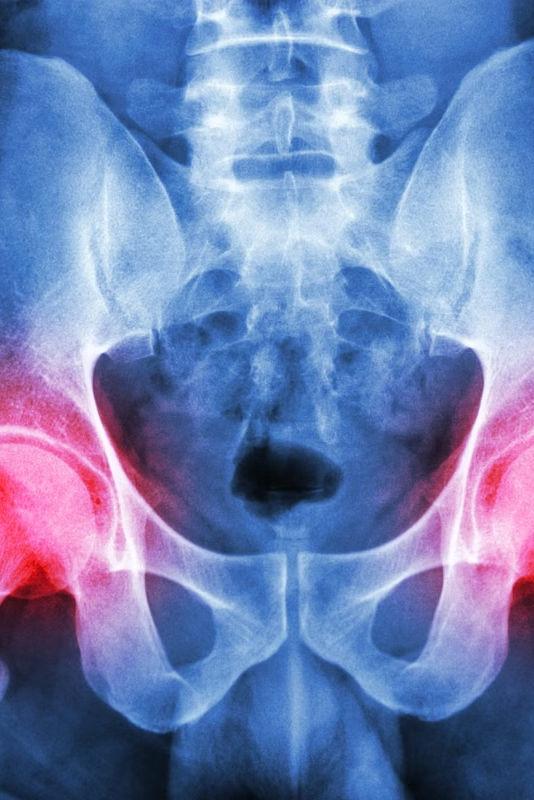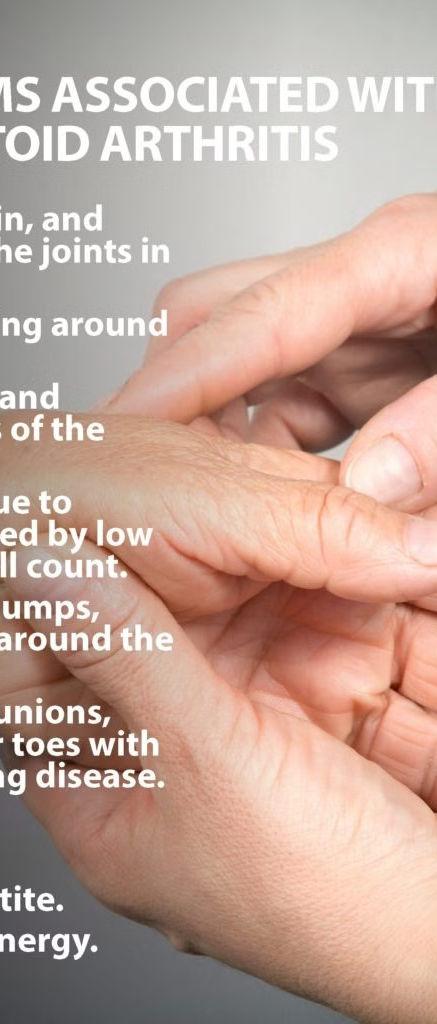

Rheumatoid Arthritis
Rheumatoid arthritis is an inflammatory autoimmune disorder. In simple language, body cells itself act against other body cells due to inherent unique genetic makeup which when exposed to external stimuli/ factors leads to chronic inflammatory state.
by Gopal Prajapati GA
Symptoms of Rheumatoid Arthritis
1 Joint Pain
Rheumatoid arthritis primarily affects the small joints in the hands and feet, causing pain, swelling, and stiffness.
3 Fever
Low-grade fever is a common symptom as the body tries to fight the inflammation.
2 Fatigue
Rheumatoid arthritis can lead to persistent fatigue and a general feeling of malaise.
4 Joint Deformity
Over time, the inflammation can cause permanent joint damage and deformity if not properly managed.

Causes of Rheumatoid Arthritis
Autoimmune Response
Rheumatoid arthritis is an autoimmune disorder, where the body's immune system mistakenly attacks its own healthy joint tissues.
Genetic Factors
Certain genes can increase the risk of developing rheumatoid arthritis, but environmental triggers are also believed to play a role.
Environmental Factors
Factors such as infections, smoking, and exposure to certain chemicals may trigger the autoimmune response in those genetically predisposed.


Diagnosis and Early Detection
1 Physical Exam
A rheumatologist will examine the joints for signs of swelling, tenderness, and reduced range of motion.
2 Lab Tests
Imaging Studies
X-rays, MRI, or ultrasound scans can help identify joint damage and guide treatment decisions.
3
Blood tests can detect the presence of rheumatoid factor and anticitrullinated protein antibodies, which are associated with rheumatoid arthritis.

Treatment Options for Rheumatoid Arthritis
Medications
A variety of medications, including antiinflammatory drugs, DMARDs, and biologics, can help reduce inflammation and slow disease progression.
Physical Therapy
Exercises and other physical therapy interventions can help maintain joint function, reduce pain, and improve overall well-being.
Surgery
In severe cases, joint replacement surgery may be necessary to restore function and alleviate pain.
Complementary Therapies
Techniques like acupuncture, massage, and stress management can be used alongside traditional treatment to manage symptoms.

Lifestyle Changes to Manage Rheumatoid Arthritis
Healthy Diet
Eating a balanced, anti-inflammatory diet can help reduce symptoms and support overall health.
Regular Exercise
Low-impact activities like swimming, cycling, and tai chi can improve joint mobility and strength.
Stress Management
Techniques such as meditation, yoga, and deep breathing can help manage the emotional and physical impacts of rheumatoid arthritis.
Maintaining a Healthy Weight
Excess weight can put additional strain on the joints, so maintaining a healthy weight is important.

The Importance of Early Intervention
Early Diagnosis
1
Consult with the experienced orthopedic doctor. If you are near the Lucknow or within the city, Dr. Divyanshu Dutt Dwivedi is the best orthopedic doctor in Lucknow.
Timely Treatment
2
3
Starting effective treatments, such as disease-modifying anti-rheumatic drugs (DMARDs), can help slow disease progression and improve long-term outcomes.
Ongoing Management
Regular monitoring and adjustments to the treatment plan are necessary to ensure the best possible outcomes for people with rheumatoid arthritis.


The Best Orthopedic Doctor in Lucknow
NameDr. Divyanshu Dutt Dwivedi
SpecializationOrthopedic Surgery
ExpertiseRheumatoid Arthritis Treatment
Location
Website
Lucknow, India
www.drdivyanshu.com
Dr. Divyanshu Dutt Dwivedi is a highly respected orthopedic surgeon in Lucknow, India, known for his expertise in treating rheumatoid arthritis. With over 12 years of experience, he has helped countless individuals manage their condition and improve their quality of life.

